I am not sure if this is an issue. I am using simple.data on one of my application. I checked the records in my table. I see the ID from 1, 2,3 ,4,5, jump to 10002, 10003 ... 10041, jump again to 20018 ... 20028.
I noticed that those records that get inserted in the same day, their ID only incremented by 1. if not the same day, will incremented by 10000.
I asked this question on github. get confirmed that this is not a Simple.Data issue. more like sql server problem.
That won't be anything Simple.Data is doing. It sounds like there might be replication set up with IDENTITY ranges assigning new ranges each day, or something. But Simple.Data doesn't try to generate IDs at all, so the problem is elsewhere.
how to check the IDENTITY range?
I checked the Identity specification: Identity increment: 1 Identity seed: 1
btw, ID datatype is BigInt
